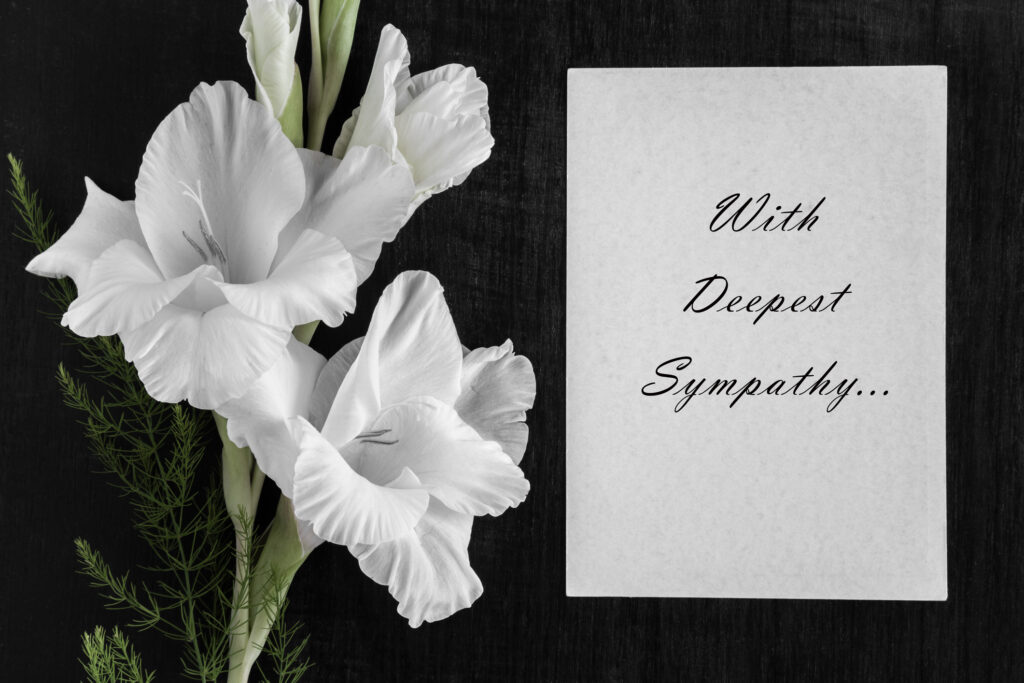Sending sympathy notes along with funeral flowers is an important way to express condolences and show support for grieving loved ones. Losing a loved one is a difficult experience, and receiving sympathy notes can provide comfort and emotional support during this challenging time.
Funeral flowers are a traditional way of expressing sympathy and honoring the deceased. However, it’s the accompanying sympathy note that adds a personal touch and communicates the sender’s heartfelt condolences. Sympathy notes can provide a source of comfort and strength for the bereaved, as they help them know that they are not alone in their grief.
Sending sympathy notes with funeral flowers also helps to preserve the memory of the deceased. It provides an opportunity for loved ones to share fond memories and express their appreciation for the impact the deceased had on their lives. In this way, the sympathy notes become a cherished keepsake that can be revisited in the future to provide comfort and support.
Finally, sending sympathy notes with funeral flowers is an act of kindness and empathy that can make a lasting impact. It demonstrates that the sender is thinking of the bereaved during their time of need, and that they are willing to take the time and effort to express their condolences. This small gesture can go a long way in helping the bereaved feel loved and supported during a difficult time.
Table of Contents
Sympathy Note Writing Tips
Writing a sympathy note can be a difficult task, as it’s hard to find the right words to express condolences. Here are some sympathy note writing tips that can help you express your condolences and offer comfort to the bereaved:
- Begin with a sincere expression of sympathy: Start by expressing your condolences and acknowledging the loss. Use simple and sincere language to express your sympathy and let the bereaved know that you are thinking of them during this difficult time.
- Share a personal memory: If you have a fond memory of the deceased, share it in your note. This can be a comforting way to help the bereaved remember their loved one and feel connected to their memory.
- Offer support and help: Let the bereaved know that you are available to help and offer support in any way possible. This can include running errands, providing meals, or just being there to listen.
- Avoid clichés: While well-intentioned, clichés like “time heals all wounds” or “they’re in a better place” can come across as insincere or insensitive. Instead, focus on expressing your sympathy in your own words.
- Keep it simple: A sympathy note doesn’t need to be lengthy or elaborate. A simple, heartfelt message can be just as meaningful as a longer one.
- Close with a thoughtful sentiment: Close your note with a thoughtful sentiment, such as “You and your family are in my thoughts and prayers” or “May your cherished memories bring you comfort and peace.”
Remember that the most important thing is to be sincere and heartfelt in your message. A well-written sympathy note can provide comfort and support to the bereaved during a difficult time.
Expressing Condolences with Funeral Flowers
Funeral flowers are a traditional way of expressing condolences and honoring the deceased. Here are some ways that funeral flowers can help you express your condolences:
- Provide comfort: Funeral flowers can provide a source of comfort and solace during a difficult time. They offer a visual reminder that the bereaved are not alone in their grief, and that others are thinking of them.
- Honor the deceased: Funeral flowers are a way to honor the memory of the deceased and show respect for their life. They can be a symbol of the love and respect that the bereaved had for their loved one.
- Offer support: Sending funeral flowers is a way to show support for the bereaved and let them know that you are there for them during their time of need. They offer a tangible expression of sympathy and can be a source of emotional support.
- Express sympathy: Funeral flowers can also be used to express condolences and sympathy for the bereaved. A note accompanying the flowers can express your heartfelt condolences and offer support during this difficult time.
- Personalize the tribute: Funeral flowers can be personalized to reflect the deceased’s personality or interests. This can be a meaningful way to honor their memory and offer comfort to the bereaved.
Overall, funeral flowers are a thoughtful and meaningful way to express condolences and honor the memory of the deceased. They offer comfort and support to the bereaved and can provide a lasting tribute to the life that was lived.
Personalizing Sympathy Notes with Funeral Flowers
Personalizing sympathy notes with funeral flowers can add a heartfelt and meaningful touch to your message of condolences. Here are some ways to personalize your sympathy notes with funeral flowers:
- Use the deceased’s favorite flowers: If you know the deceased’s favorite flowers, incorporating them into the funeral arrangement can be a touching tribute to their memory.
- Choose colors that have significance: Colors can have symbolic meaning and can be used to convey a message of sympathy. For example, white flowers are often associated with peace and purity, while pink flowers can represent love and admiration.
- Include a personal touch: Adding a personal touch to your sympathy note can make it more meaningful. This can be something as simple as addressing the bereaved by name, or including a personal message of support and comfort.
- Consider the bereaved’s preferences: If you know the bereaved well, consider their preferences when choosing funeral flowers. For example, if they prefer a particular type of flower or color, incorporating these into the arrangement can show that you are thinking of them during this difficult time.
- Add a special item: Including a special item with the funeral flowers can also personalize your message of condolences. This can be something like a photo of the deceased or a small token that has significance to the bereaved.
Remember that personalizing your sympathy note with funeral flowers is a way to show your support and offer comfort to the bereaved. By incorporating personal touches and thoughtful gestures, you can create a lasting tribute to the memory of the deceased.
Examples of Sympathy Notes for Funeral Flowers
Here are some examples of sympathy notes for funeral flowers:
- “In loving memory of [Name], may these flowers bring comfort and peace during this difficult time. With heartfelt sympathy, [Your Name].”
- “Wishing you peace and comfort as you navigate this difficult time. These flowers are a small gesture to let you know that you are in my thoughts and prayers. With deepest sympathy, [Your Name].”
- “We are deeply sorry for your loss. May these flowers remind you of the love and memories you shared with [Name], and bring comfort during this time of grief. With heartfelt condolences, [Your Name].”
- “Please accept these flowers as a symbol of my love and support during this difficult time. I am here for you and am sending my heartfelt condolences to you and your family. With love and sympathy, [Your Name].”
- “With deepest sympathy, we offer these flowers in honor and memory of [Name]. May they bring comfort and peace during this difficult time, and serve as a reminder of the love and cherished memories you shared. With heartfelt condolences, [Your Name].”
Remember that the most important thing is to express your heartfelt condolences and offer support to the bereaved during this difficult time. A simple and sincere message can provide comfort and solace to those who are grieving.
Dos and Don’ts of Writing Sympathy Notes
Writing sympathy notes can be challenging, especially during times of grief. Here are some dos and don’ts to keep in mind when writing sympathy notes:
Dos:
- Express your condolences: Express your heartfelt condolences and offer support to the bereaved. Let them know that you are thinking of them during this difficult time.
- Be sincere: Write from the heart and be sincere in your message of sympathy. Avoid using cliches or generic phrases that may come across as insincere.
- Keep it brief: Keep your message brief and to the point. A simple message of support can be just as meaningful as a lengthy note.
- Offer help: Offer your assistance if you are able to help with anything. This can include offering to cook a meal or run errands for the bereaved.
- Follow up: Follow up with the bereaved after the funeral to see how they are doing and offer ongoing support.
Don’ts:
- Avoid making assumptions: Avoid making assumptions about how the bereaved is feeling or what they are going through. Everyone experiences grief differently, so it is important to be sensitive to their individual needs.
- Don’t try to fix their grief: Grief is a natural process and cannot be fixed. Avoid giving advice or suggesting ways to “fix” their grief.
- Don’t be judgmental: Avoid making judgments about the bereaved’s decisions or actions during this difficult time.
- Don’t talk about your own experiences: While it may be tempting to share your own experiences with grief, avoid doing so unless asked. This is a time to focus on the bereaved and offer support to them.
- Don’t forget to sign your name: Always remember to sign your name at the end of the note to let the bereaved know who it is from.
Remember that the most important thing is to offer support and comfort to the bereaved during this difficult time. By being sincere and offering your help, you can provide solace to those who are grieving.
Sending Funeral Flowers with Sympathy Notes
Sending funeral flowers with sympathy notes is a thoughtful gesture that can provide comfort and support to the bereaved during a difficult time. Here are some tips to keep in mind when sending funeral flowers with sympathy notes:
- Choose the right flowers: Consider the type of flowers you want to send and their meanings. You can choose the deceased’s favorite flowers or select flowers that have a symbolic meaning.
- Include a sympathy note: Along with the funeral flowers, include a sympathy note expressing your condolences and offering support to the bereaved.
- Consider the timing: When sending funeral flowers, it is important to consider the timing. You can send flowers to the funeral home or the bereaved’s home after the funeral.
- Personalize your sympathy note: Personalize your sympathy note by adding a heartfelt message of support and comfort. Include a personal touch, such as a memory of the deceased or a special message for the bereaved.
- Follow up: After sending the funeral flowers and sympathy note, follow up with the bereaved to see how they are doing and offer ongoing support.
Remember that sending funeral flowers with a sympathy note is a meaningful way to offer support and comfort to the bereaved. By choosing the right flowers and personalizing your message, you can create a lasting tribute to the memory of the deceased and provide solace to those who are grieving.
Conclusion: Remembering the Deceased with Sympathy Notes and Funeral Flowers.
In times of grief and loss, expressing condolences with sympathy notes and funeral flowers can be a powerful way to honor the memory of the deceased and offer comfort to the bereaved. By taking the time to choose the right flowers and personalize your message of support, you can provide solace to those who are grieving and create a lasting tribute to the life and legacy of the deceased.
It is important to remember that grief is a personal and individual experience, and there is no right or wrong way to express condolences. The most important thing is to be sincere and offer support to the bereaved during this difficult time. By following the dos and don’ts of writing sympathy notes, choosing the right flowers, and personalizing your message, you can make a meaningful gesture that will be appreciated by the bereaved for years to come.
Remember that the memory of the deceased lives on in the hearts and minds of those who knew and loved them. By expressing your condolences with sympathy notes and funeral flowers, you can honor their memory and provide comfort and support to those who are grieving.






